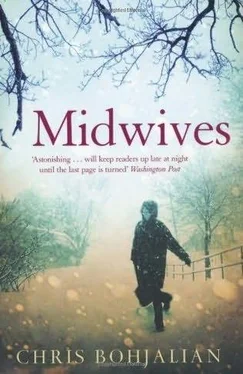Chris Bohjalian - Midwives
Здесь есть возможность читать онлайн «Chris Bohjalian - Midwives» весь текст электронной книги совершенно бесплатно (целиком полную версию без сокращений). В некоторых случаях можно слушать аудио, скачать через торрент в формате fb2 и присутствует краткое содержание. Жанр: Современная проза, на английском языке. Описание произведения, (предисловие) а так же отзывы посетителей доступны на портале библиотеки ЛибКат.
- Название:Midwives
- Автор:
- Жанр:
- Год:неизвестен
- ISBN:нет данных
- Рейтинг книги:5 / 5. Голосов: 1
-
Избранное:Добавить в избранное
- Отзывы:
-
Ваша оценка:
- 100
- 1
- 2
- 3
- 4
- 5
Midwives: краткое содержание, описание и аннотация
Предлагаем к чтению аннотацию, описание, краткое содержание или предисловие (зависит от того, что написал сам автор книги «Midwives»). Если вы не нашли необходимую информацию о книге — напишите в комментариях, мы постараемся отыскать её.
Midwives — читать онлайн бесплатно полную книгу (весь текст) целиком
Ниже представлен текст книги, разбитый по страницам. Система сохранения места последней прочитанной страницы, позволяет с удобством читать онлайн бесплатно книгу «Midwives», без необходимости каждый раз заново искать на чём Вы остановились. Поставьте закладку, и сможете в любой момент перейти на страницу, на которой закончили чтение.
Интервал:
Закладка:
"I've seen you ski. With your dad and mom."
"Just my dad. My mom doesn't like to ski."
"She's smart. Snowmobiling's more fun. You go faster, and you get plenty of exercise. More than most people realize."
"I don't think she likes to snowmobile either."
He flicked his cigarette toward his feet and ground it deep into the mud.
"You have Mrs. Purta for French, right?"
"Right."
"Like her?"
"I do. Sure."
He nodded, taking this fact in and turning it over in his mind for meaning. A signal. Confirmation, perhaps, of my maturity. Then he said something that might have been threatening to me had I not heard three of those words from my mother only a short while before, a coincidence that suggested to me a cosmic rightness. Moreover, his voice was suddenly filled with an unease that mirrored my own.
"A kiss before I go, please?" he asked, and there was a quiver in his words that transformed "please" into a two-syllable request. I stood still before him, which was about as close to an affirmation as I could offer at twelve, and after a second long enough for goose bumps to grow along my arms and dance along the skin under the sleeves of my shirt and my sweater, he leaned toward me and pressed his lips against mine. We both opened our mouths a sliver and tasted each other's breath.
It was only after he stood up straight and our bodies parted that I realized he hadn't put his tongue into my mouth. I was glad, but mostly because I wouldn't have known how to juggle Tom Corts's tongue with the large piece of bubble gum hiding somewhere at that moment in my cheek.
It would be a good eight months before Tom and I would become boyfriend and girlfriend, and a full year and a half before I would look to the back of a courtroom in Newport and see him standing there, watching. It would be a full year and a half before I would find myself crying at night in his arms.
Chapter 3.
Zygote isn't a bad word, but it's far from perfect. On the one hand, I love the word's origin-the Greek word for "joining together." That feels right to me, because that's about what has occurred. An egg and a sperm have joined together, and they're on this cool little pilgrimage to the uterus.
On the other hand, I don't like the way the word sounds when you say it out loud: Zygote! It always sounds like it needs an exclamation point. It always sounds like a curse from some angry mad scientist. Zygote! The beaker is cracked! Zygote! There's radium all over the lab!
– from the notebooks of Sibyl Danforth, midwife
MY MOTHER WAS NAMED Sibyl after her grandmother on her mother's side. Her grandmother was born in a small village in eastern Mexico, the daughter of missionaries from Massachusetts. Those missionaries-my mother's great-grandparents-spent ten years in a little coastal town called Santiago, a decade in which they founded a Catholic church, became very good friends with a village healer named Sibella, and had two children. One of those children lived-my mother's grandmother-and one didn't.
The one who didn't was a boy they named Paul, and it was his death by drowning that destroyed that family's faith and sent them packing back to the United States. I was told Paul drowned in shallow water, which for years in my mind conjured an image of choppy Gulf surf near the beach, and a three-year-old child bobbing for moments in waves before he was pulled under for the last time. Eventually my mother told me this wasn't what she believed happened at all. The family tradition-myth or reality, who knows-is that he died in the bathtub.
When those missionaries and their daughter returned to the United States, they almost resettled as they had planned in central Massachusetts, but in their attempt to rebuild their lives they decided to start fresh in a new place, and just kept heading north until they were beyond Massachusetts and New Hampshire, in Vermont. In Reddington.
I think most people my age assume that children died so frequently in the nineteenth century that people didn't grieve as profoundly or as long as we do today. I don't believe that. The woman for whom my mother was named was born in 1889, and that woman's brother in 1891. He died in 1894: There's one marker for the boy in the Reddington cemetery, another one in that family's plot in a cemetery in the town of Worcester, Massachusetts, and a third tombstone marking the body's actual remains in a graveyard in Santiago.
No one knows who was responsible for bathing Paul when he died. That detail is lost in our family history.
In any case, when those missionaries who had once had the zeal to move to Mexico to spread God's word and build a church-literally, help construct the sandstone structure under the searing sun with their pale New England hands-finally settled in Reddington, they rarely set foot in any church, Catholic or Protestant, again.
My mother was a full-fledged, honest-to-God, no-holds-barred, Liberation News Service, peace-love-and-tie-dye hippie. This was no small accomplishment, since she grew up in a small village in northern Vermont. Villages like Reddington are buffered from cultural change by high mountains, harsh weather, bad television reception, and low population density (which might explain why she never actually tried to escape to places like San Francisco, the East Village, or Woodstock), so it probably took a certain amount of attentiveness, research, and spine to find the revolution-or even a decent peasant skirt.
Although Sibyl never actually moved into a school bus or commune, the photographs of her taken during the second half of the 1960s show a woman who apparently lived in bell-bottoms and shawls, love beads and medallions and sandals. Those photos reveal a woman with round blue eyes and spiraling dirty blond hair, characteristics I've inherited, although my hair is flatter by far than hers ever was.
She went to Mount Holyoke for two years, but met a slightly older man while waitressing on Cape Cod the summer between her sophomore and junior years and decided to drop out and spend the winter in a cottage with him on the ocean. It didn't last long. By Thanksgiving she was settled in Jamaica Plain in Boston, helping the Black Panthers start a breakfast program for the poor, while answering telephones for an alternative newspaper. By the spring she had had enough-not because she had grown tired of the movement with a capital M, but because she longed for the country. For Vermont. She wanted to go home, and finally she did.
She returned just before her twentieth birthday, telling her parents she'd stay through the summer and then resume her studies in the fall. My grandmother always insisted that my mother had dropped out with very good grades, all A's and B's, and Mount Holyoke would have been happy to take her back.
But I don't think returning to college was ever very likely. She had already developed what was then a popular distaste for most traditional or institutional authority, and somehow Mount Holyoke had become suspect in her eyes. Besides, by July she had fallen in with a group of self-proclaimed artists in the hills northeast of Montpelier, an assemblage of singers and painters and writers that included an illustrator who would eventually decide to become an architect instead of an album cover designer-my father. The men in the group remained in college so they wouldn't lose their draft deferments, but the women dropped out and threw pots, hooked rugs, wrote songs.
My mother became pregnant with me soon after that, and she and my father always reassured me that there was never any discussion of finding an expert in Boston or Montreal who would know how to make me go away.
Knowing my parents, I indeed believe the idea of aborting me never crossed my mother's mind, but I'm sure the thought occurred to my father. I'm positive. I have never doubted his love, and I believe he's very glad I'm here, but he has always been a tidy man, and unplanned pregnancies are usually pretty messy affairs. My conception postponed indefinitely, and then forever, any discussion of Sibyl's returning to college.
Читать дальшеИнтервал:
Закладка:
Похожие книги на «Midwives»
Представляем Вашему вниманию похожие книги на «Midwives» списком для выбора. Мы отобрали схожую по названию и смыслу литературу в надежде предоставить читателям больше вариантов отыскать новые, интересные, ещё непрочитанные произведения.
Обсуждение, отзывы о книге «Midwives» и просто собственные мнения читателей. Оставьте ваши комментарии, напишите, что Вы думаете о произведении, его смысле или главных героях. Укажите что конкретно понравилось, а что нет, и почему Вы так считаете.











